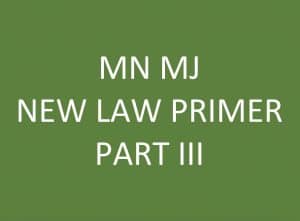MN MJ: A Primer on Minnesota’s New Marijuana Laws – Part III
Recently, we went over the limitations on Minnesota’s New Marijuana Laws, including age, amount, and location in Part I and sale or possession of marijuana or tetrahydrocannabinols offenses in Part II. Here, we review the impact the Minnesota’s new marijuana law has on expungements. Notably, anybody who has a misdemeanor or petty misdemeanor marijuana (or cannabis) conviction will automatically be eligible for an expungement. Other convictions that stem from marijuana including first degree-controlled substance offenses may be eligible but are not automatic. The requirements to be eligible are:
- Offense involves the sale or possession of marijuana or tetrahydrocannabinols.
- The offense did not involve a dangerous weapon, the intentional infliction of bodily harm on another, an attempt to inflict bodily harm on another, or an act committed with the intent to cause fear in another of immediate bodily harm or death;
- The original offense would be a lesser offense or legal under the new law (if originally a felony the new offense must be a nonfelony); and
- The person did not appeal the conviction, the appeal was denied, or the deadline to file an appeal has expired.
The new Cannabis Expungement Board will be the controlling body reviewing cases and offenses with some being eligible for automatic expungement and some just recommended to the applicable Judicial Court for expungement. In some cases, a person may be able to get their case reopened with the conviction vacated and ultimately dismissed, instead of just expunged (or sealed), or resentenced to a lesser offense. There is also expanded eviction expungement opportunities for people who were evicted based on marijuana crimes that are eligible for expungement. Anybody who is not a United States Citizen will want to make sure they have copies of their case records as they will be needed during the citizenship process.
The new cannabis law also provides extra protections and privacy for people involved in the medical cannabis program. Removed random drug testing by employers unless the position is considered a “safety-sensitive position” meaning a job in which impairment by drug, alcohol, or cannabis usage would threaten the health and safety of any person. But employers can still discipline or discharge an employee for using, possessing, selling, or being impaired by cannabis during work hours, on work premises, or while operating an employer’s vehicle, machinery, or equipment.
Benjamin Koll is a criminal defense lawyer and DWI attorney in the Twin Cities. Minnesota. Super Lawyers named him a Rising Star this year. He is an adjunct professor at Mitchell Hamline School of Law. Drug Crimes Attorney Minnesota; Criminal Defense Lawyer Woodbury MN; and DWI Lawyer Minnesota.

